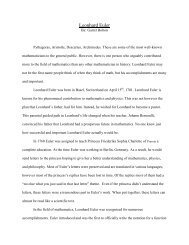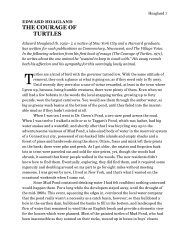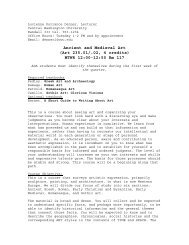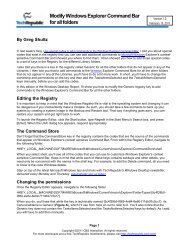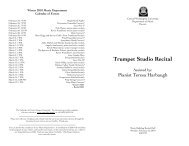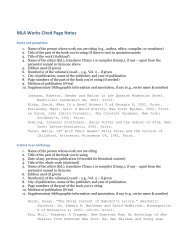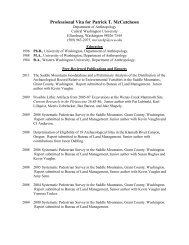The Ingenious Gentleman Don Quixote de la Mancha
The Ingenious Gentleman Don Quixote de la Mancha
The Ingenious Gentleman Don Quixote de la Mancha
Create successful ePaper yourself
Turn your PDF publications into a flip-book with our unique Google optimized e-Paper software.
154 <strong>Don</strong> <strong>Quixote</strong> <strong>de</strong> <strong>la</strong> <strong>Mancha</strong> <br />
<br />
"Ay," said Sancho; "it must be that some of your worship's shrewdness sticks to me; <br />
<strong>la</strong>nd that, of itself, is barren and dry, will come to yield good fruit if you fertilize it <br />
and till it; what I mean is that your worship's conversation has been the manure that <br />
has fallen on the barren soil of my dry wit, and the time I have been in your service <br />
and society has been the tilling; and with the help of this I hope to yield fruit in <br />
abundance that will not fall away or sli<strong>de</strong> from those paths of good breeding that <br />
your worship has ma<strong>de</strong> in my parched un<strong>de</strong>rstanding." <br />
<br />
<strong>Don</strong> <strong>Quixote</strong> <strong>la</strong>ughed at Sancho's affected phraseology, and perceived that what he <br />
said about his improvement was true, for now and then he spoke in a way that <br />
surprised him; though always, or mostly, when Sancho tried to talk fine and <br />
attempted polite <strong>la</strong>nguage, he wound up by toppling over from the summit of his <br />
simplicity into the abyss of his ignorance; and where he showed his culture and his <br />
memory to the greatest advantage was in dragging in proverbs, no matter whether <br />
they had any bearing or not upon the subject in hand, as may have been seen <br />
already and will be noticed in the course of this history. <br />
<br />
In conversation of this kind they passed a good part of the night, but Sancho felt a <br />
<strong>de</strong>sire to let down the curtains of his eyes, as he used to say when he wanted to go to <br />
sleep; and stripping the Dapple he left him at liberty to graze his fill. He did not <br />
remove Rocinante's saddle, as his master's express or<strong>de</strong>rs were, that so long as they <br />
were in the field or not sleeping un<strong>de</strong>r a roof Rocinante was not to be stripped – the <br />
ancient usage established and observed by knights‐errant being to take off the <br />
bridle and hang it on the saddle‐bow, but to remove the saddle from the horse – <br />
never! Sancho acted accordingly, and gave him the same liberty he had given the <br />
Dapple, between whom and Rocinante there was a friendship so unequalled and so <br />
strong, that it is han<strong>de</strong>d down by tradition from father to son, that the author of this <br />
veracious history <strong>de</strong>voted some special chapters to it, which, in or<strong>de</strong>r to preserve <br />
the propriety and <strong>de</strong>corum due to a history so heroic, he did not insert therein; <br />
although at times he forgets this resolution of his and <strong>de</strong>scribes how eagerly the two <br />
beasts would scratch one another when they were together and how, when they







